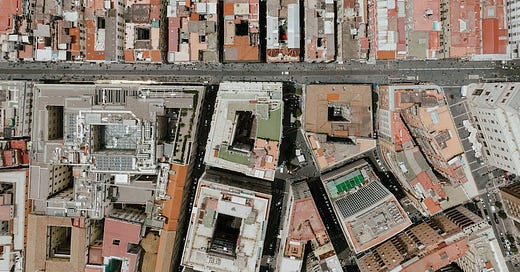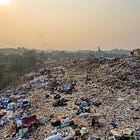Our modernised helplessness is a barrier to solving the climate crisis
I don’t know how we can turn back the wheels of modernised helplessness, but whilst we figure this one out, we need to consider what we want to bring into the new world.
Before we get into it, I wanted to say a quick hello to the new readers who have come over from my article on Gen Dread! Thank you for subscribing, I hope you enjoy it over here. If you haven’t read my piece in Gen Dread, I’ve linked it at the bottom of this article. 👋
It’s a popular statement that those who pay the highest price for climate change contribute to it the least.
We can see this in how if we all lived like the population of Chad, one of the world’s most climate-vulnerable countries, we would easily stay within planetary boundaries. Those of us in the global north are some of the biggest individual contributors to climate change, if we all lived like the average American, we would need 5.1 Earths to sustain us all (sorry, we can’t fob it all off to corporations).
Sure, we get droughts, which might cause a ‘food shortage’ in your local Sainburys (remember when we couldn’t buy peppers for like a week?). You might even experience air pollution from wildfires. But we’ve never experienced the real horrors of the climate crisis; heatwaves, floods, droughts, fires.
Yes, we are the least affected by climate change and we are in an extremely privileged position. But, in a way, we are often the ones who are most cut off from any possibility of reactivating older institutions, ones that know how to live in harmony with the environment and the local land and could guide us to a better future.
This seems to be a uniquely Western problem. Author Amitav Ghosh talks about how simplistic climate change effects such as heatwaves and power outages cause death and destruction in Europe and America, but in a ‘Global South’ country like India, the power goes out several times a day, and no one notices. Even the middle and upper classes are used to the effects of climate change, a resilience which is lacking in countries where we’re used to everything working (again, think of the pepper panic).
We’re so dependent on existing systems we don’t even notice they exist–until they break down. Just take away one piece of our modern lifestyles and we are suddenly unable to function. A power cut? No cooking, no heating, no warm showers, not even the ability to boil the kettle for a lukewarm bath. A food supply chain issue? I don’t know a single person in my local area who grows any type of fruit or vegetables. Water shortages? If water couldn’t be pumped into my apartment, the nearest place for me to access water is a natural spring, just a short 40-mile round trip. It’s pretty clear that we are fundamentally unable to take care of ourselves, or each other.
Westerners are often cast as both the villain and the hero of climate change. We’re the villain because we’ve created so many of these problems with our unquenchable thirst to pillage, develop, and create more and more crap. But we also see ourselves as the hero, we’re going to save the world with our unrealistic techno-fixes (that don’t yet exist). We have the self-important sense that if we just had the right technology we could fix all of the world’s problems and then everyone would be happy.
I’ve heard encouragement to listen to the original steward of our lands, to speak to the indigenous people and ask them to guide us to a less polluting way of life. If you live in the Americas, Australia, or one of a number of countries with an indigenous population, this is a great opportunity, but it’s a challenge for those of us who live in Britain or further afield in Europe, there are no indigenous people to speak of, how can we learn to take care of the land when we’re so far removed from it?
The answer I often come to when I think about our modernised helplessness is the usual mutterings of buying an off-grid cabin in the woods somewhere and learning how to live off the land. Perhaps if I save up enough money I could invite my loved ones in times of disaster and we could live happily ever after in our own little commune. But I have to remind myself this kind of life isn’t the answer. What good does it do if the lucky ones get to abandon society, whilst the rest of the world still burns? Pollution and suffering exist whether we live in a hut eating roots and berries, or in an apartment in the city centre.
I’ve spoken before about caring for your local areas, that if we all worked on growing seasonal food, caring for our neighbours, reducing our waste, and picking up litter, then we could leave the world in a better state than how we found it.
I don’t know how we can turn back the wheels of modernised helplessness, but whilst we figure this one out, we need to consider what we want to bring into the new world. Because learning new skills for a new future is an act of resilience. Creating a community of individuals who can look after each other is an act of resilience. Building a better way of life for yourself–and those around you–is an act of resilience.
I can’t yet name the plants I meet on my walks, nor can I name the bird calls I hear outside of my window, but I can learn how to feed my family with food grown in my community garden, support builders and creators using reclaimed materials, and connect with people who live a stone’s throw away from my front door. Anything we learn to do for ourselves–actions that can be taken out of the hands of large corporations in an act of helplessness–is a way of helping our Earth. This is my act of resilience.
P.S. If you enjoy my writing, you can buy me a coffee to fuel my work.
I recently wrote a piece for one of my favourite substacks
about the relentless pressures younger people feel to stop the climate crisis. Give it a read and don’t forget to subscribe to Gen Dread whilst you’re over there. 👇You might also like to read:










Thanks so much for this much needed, beautifully written, kick in the butt to get moving on the ideas and projects that are stating us in the face, especially the local ones. All the modern Enviro victories of resistance I can think of all started with neighbourhood solidarity. As soon as I get organised I'll definately kick in for the coffee, you deserve it.